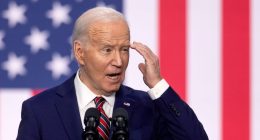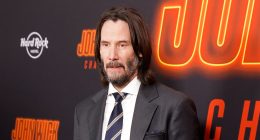
Sept. 11, 2001 was the day that America lost its innocence, says Rashida Jones, president of MSNBC, who covered that fateful day two decades ago as a 20-year-old college student working as a full-time morning show producer at WTKR, a local TV station in Norfolk, Virginia.
“We didn’t know how innocent we were as a country. We didn’t know how consequential decisions were. It can change the world. It can change who you are as a person,” Jones told The Hollywood Reporter as the documentary Memory Box Echoes of 9/11 gets set to screen on Saturday at the Toronto Film Festival after bowing on MSNBC and Peacock on Wednesday.
To mark the 20th anniversary of the September 11, 2001 terrorist attacks in the U.S., TIFF will hold a special screening from Yard 44 and NBC News Studios of the documentary by directors Bjørn Johnson and David Belton. The film explores the aftermath of the terrorist attacks in the U.S. via recordings made in a simple video booth that captured the emotional responses of around 500 Americans.
The 2001 terrorist attacks came midway through the Toronto Film Festival that year and forced fest organizers to pause screenings, shut down red carpets and help attendees as they attempted to return home.
Jones recalled that, as she worked round the clock during the first week after the 9/11 terrorist attacks to produce hours of coverage and slept in an edit booth to better prepare for the morning newscast, she was transformed as both a journalist and a person. “I would be up all night long, watching every minute of the coverage, because as an American, as a human, I didn’t want to miss something. I felt like we were under attack, our innocence was under attack,” she recounted.
Two decades later, those voices captured by Johnson and Belton via their simple video booth have returned via the MSNBC documentary to offer a collective and very human account of that fateful day. “That’s the beauty of why this documentary is so moving and has touched so many people, is that you have the distance of time to get the perspective, but you also see there’s still hurt, there’s still pain, there’s still a setting at the dinner table where that person is no longer there 20 years later,” Jones said.
Of course, allowing people in that wooden booth to speak without direction or time constraints — they set the camera rolling and they decided when to turn it off — goes against every tenet of journalism practiced by 24-hour cable news channels like MSNBC, where many gatekeepers open and close the news gate for those interviewed on camera, Jones concedes.
“It goes against how journalism normally works. We’re the storytellers. We’re the content creators who craft stories and use our own lens and imagination to bring it to life,” she insisted. But Jones adds what works in Memory Box Echoes of 9/11 is the humanity of those who survived the terrorist attacks to recount their experiences.
“What works so well here is it was so raw. Every person who spoke on camera willingly went into the booth, and in some ways it was a method of therapy, to let some emotional out,” Jones said. The MSNBC boss, who today is 40 years old and is a mother to a 12-year-old daughter and a 15-year-old son, insists that the baptism of fire she underwent covering the terrorist attacks for the local Virginia TV station two decades ago was key to preparing her to become the first Black executive to lead a major television news network.
“The Rashida that sits here today wouldn’t be able to sit in this chair without having lived through some of those experiences… It just thrust me into this space of covering stories that matter, covering stories that affect the world and this (9/11) was the first one that I covered in that way,” Jones insisted.
At bottom, she adds the demands of the 24 hour news cycle and competitive cable news channels serving a divided and uncertain America come down to humanity. “It’s all people and I’ll even make it more personal, it’s all me — everything that we’re talking about, everything that we’re covering, it affects me as a human, it affects me as a person and really balancing that, not only do I have a job and a responsibility as a journalist, but never to lose the humanity in that is what has driven me as a storyteller,” Jones told THR.
Source: HollyWood









